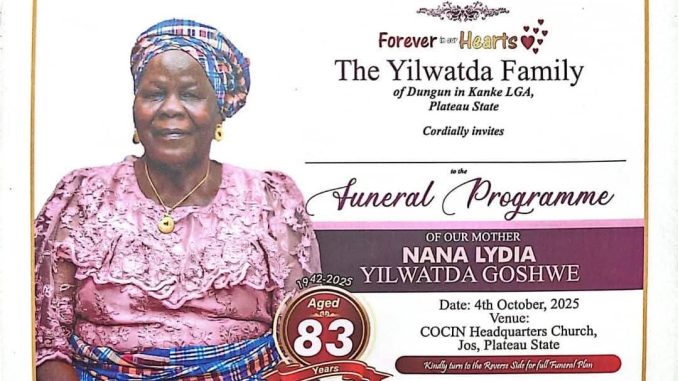
02 Oct 2025
Opinion:D.M. Long’gul
President Bola Ahmed Tinubu’s planned visit to Plateau State for the funeral of late Na, Lydia Yilwatda, the mother of the All Progressives Congress (APC) National Chairman, Professor Nentawe Yilwatda, is far more than a simple act of condolence.
It is worthy to note, that, this is the first official visit of Mr. President to Plateau state and reportedly only the second burial he has attended as Nigeria’s President, the first being the state burial of his predecessor, former President Muhammadu Buhari.
This visit to Plateau, a state currently governed by the opposition Peoples Democratic Party (PDP), carries significant political and symbolic weight for both the ruling APC and the entire Plateau community.
The primary political significance of the visit lies in its impact on the All Progressives Congress (APC) in Plateau State. By attending the burial of the mother of the National Chairman, a Plateau son, President Tinubu is explicitly showing support and solidarity for the state’s most prominent APC figure. This move elevates Professor Yilwatda and his immediate political family, signaling to both party members and the electorate that the state’s APC leadership has a direct, potent connection to the seat of power.
This moment also offers the APC a rare opportunity for organic political mobilisation and visibility in an opposition-controlled state. The presidential entourage and media spectacle act as a massive, subtle rally, reinforcing the message that the ruling party at the centre is invested in the state.
While the hopes are high,the Governor seems to have Challenge and a Missed Opportunity because the presidential visit is typically an occasion for the host state government to showcase its achievements through project commissioning. In this instance, however, President Tinubu will not be using “two stones to kill one bird” by commissioning new projects. The incumbent Governor, Barr. Caleb Mutfwang (PDP), faces the challenge of not having a major high-level project to present, two years into his administration.
Furthermore, the Governor himself has been quoted claiming his current legacies are focused on intangible achievements,they are “in the hearts of men and women of Plateau State” an assumption rooted in idealism without material demonstration. This lack of a tangible “showpiece” project leaves a void that opposition figures, easily highlight on the slightest criticism.
Given this context, the visit transforms into a high-stakes, politically exposed moment for the Governor. To mitigate the political embarrassment of having no tangible project for the President to commission, Governor Mutfwang can reach out to the chief mourner, Professor Nentawe Yilwatda, to persuade the President to at least hold a security-focused meeting with key stakeholders in the absence of projects.
Such a meeting would redirect the focus from the absence of projects to the critical issue of security, which is the most pressing concern for the people of Plateau. It would allow the Governor to demonstrate leadership and secure much-needed federal commitment, turning a potential political vulnerability into an opportunity for vital federal collaboration.
For the people of Plateau, the visit is a monumental event. It marks the President’s first physical presence in a state that has been grappling with persistent and devastating security challenges. The lack of a presidential visit despite the scale of the tragedies had become a painful point of criticism. Notwithstanding,President Tinubu’s presence now, while for a private mourning event, serves as a powerful symbol of federal attention because of the following:
Acknowledgement and Empathy: A presidential visit, regardless of its primary purpose, draws national focus to the state. It offers a crucial public opportunity for the President to directly and publicly address the ongoing security and humanitarian crisis in Plateau. A heartfelt statement on peace and security can go a long way in healing a traumatized populace and reassuring them of federal engagement.
Intensified Focus on Insecurity: The security and media attention that follows a sitting President could pressure security agencies to prioritize the region, potentially leading to a re-evaluation and recalibration of security strategies of the state
In this context, an old African proverb resonates with a clear and potent warning to the opposition PDP: “When a big tree falls, the ground feels it.”
The “big tree” is the President of the Federal Republic of Nigeria, and his first visit to Plateau State has made the political ground rumble. This visit, ostensibly for a family burial, is fundamentally an act of investing political capital into the local APC structure through its National Chairman, Professor Nentawe Yilwatda. The message is unmistakable: The ruling party, the APC, is not just a distant entity in Abuja; it now stands physically on the Plateau, demonstrating a direct, undeniable link to the nation’s highest office. For the opposition PDP, which currently holds the state, this is a clear signal to “watch out.” The presence of the President will reinforce the local APC chapter, boosts the morale of its members, and subtly reminds the electorate of the formidable power that backs the party at the national level.
By physically showing up, President Tinubu will deliver a powerful, non-verbal declaration that the APC is committed to reclaiming or strongly contesting the state.
While the PDP may boast of holding the state government, the political weight and influence brought by the President’s visit make it clear: The APC is stronger, more influential, and fully engaged in the battle for the hearts and minds of the Plateau people.
Lastly,the ground has indeed shaken, and the opposition must now reckon with the renewed strength of the political force that just landed on their territory.
